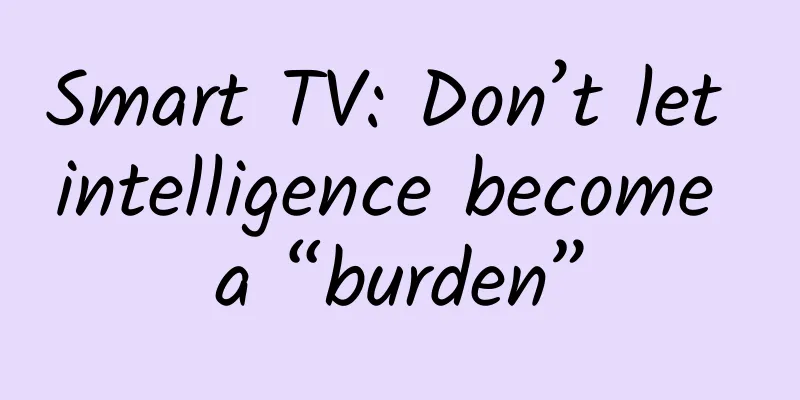Smart TV: Don’t let intelligence become a “burden”

|
Smart TVs have gradually become the mainstream in the domestic color TV market. In order to stand out from the crowd, vendors have begun to try every possible means to add new features to TVs to make them look more "smart." Developers are also eager to experiment on large-screen TVs in an attempt to find the next gold mine. The process of TV intelligence has also begun to change users' perception of TV. TVs can surf the Internet, play games, recognize voices, shop, and more. They can even achieve more unexpected functions by installing software. Faced with increasingly powerful smart TVs, users have begun to question, "Does TV really need so many functions?" Video is still a "must have" From the moment it was born, the mission of television was to play video content for the audience, and this mission has continued to this day. Unlike traditional televisions, smart TVs can obtain richer audio and video content by connecting to the Internet. This also allows users to take the initiative in watching TV, getting rid of the passive situation of "I have to watch whatever the TV station broadcasts." In addition to traditional TV programs, users can watch programs from video websites by installing TV video software. Although the State Administration of Press, Publication, Radio, Film and Television has increasingly tightened its supervision of TV content, it still cannot stop users' demand for more TV content. After observing the rankings of many mainstream smart TV application markets, we found that the top ten applications downloaded by users are basically TV version video software, and the most popular among them are video aggregation software. This also shows that the main demand of users when using smart TVs is to watch video content. The emergence of smart TVs has greatly satisfied this demand of users. Video games become popular There is no doubt that TV is still the best screen for playing games in users' homes. With the lifting of the ban on game consoles, TV games have begun to return to the living room. Whether it can run games has also become one of the criteria for users to test the functions of smart TVs, which has prompted TV manufacturers to continuously improve the performance of smart TVs and inject more game content into TVs. In major smart TV application markets, game software has become the most downloaded application category after video software. Due to the limitations of TV hardware and memory, the games that can be directly downloaded to smart TVs are mainly casual games, such as Landlord, Mahjong, and Airplane Shooting, which have the largest downloads. If users want to play larger and more complex games on TV, they currently need the assistance of hardware such as game consoles and game boxes. "Do smart TVs need to be smarter?" The answer to this question is yes. Smart TVs need to be "smarter" through a large number of expandable applications, but having a large number of applications is not the only criterion for "smartness". Some applications will only make the TV look more "stupid", such as browsing the web with the TV's clumsy operations, chatting on QQ, using the turned on TV as an alarm clock, using the TV to listen to the radio, etc. These software developed on mobile and PC ends, when rigidly grafted onto the TV, will directly harm the user experience. The reason for these problems is that some developers did not consider the public attributes and operating restrictions of TV and simply made a simple transplant. Take the social function as an example. TV itself is not suitable to be used as a private social screen in an open environment, but combining social functions with the "rigid needs" of TV will produce different effects, such as video barrage and video dialogue in game battles. For the smart TV, both manufacturers and developers should focus on the characteristics of the TV screen, because the TV cannot become a "smart phone" or a "supercomputer". For example, due to operational limitations, the TV is not suitable to be the control center of the family, but it is more suitable to be the information aggregation center and output device of home appliances, which can be presented on the big screen to let users know and make corresponding instructions based on the information. Lu Renbo, deputy secretary general of the China Electronic Commerce Association, believes that "smart TVs, like cameras, should be more convenient." A true smart TV is not about having more functions, but about continuously improving the interactive experience. Through hardware upgrades and software development, the TV is more in line with the user's usage habits, so that users can get what they need in just a few steps, without being "lost" in complex operations and massive applications. As Internet companies, operators, and software developers flock to the smart TV field, the outside world often ignores the intrinsic value of smart TVs while paying close attention to the commercial value of smart TVs. If we demand blindly upgrade hardware and fill in applications, "intelligence" will eventually become a "burden" for TVs. As a winner of Toutiao's Qingyun Plan and Baijiahao's Bai+ Plan, the 2019 Baidu Digital Author of the Year, the Baijiahao's Most Popular Author in the Technology Field, the 2019 Sogou Technology and Culture Author, and the 2021 Baijiahao Quarterly Influential Creator, he has won many awards, including the 2013 Sohu Best Industry Media Person, the 2015 China New Media Entrepreneurship Competition Beijing Third Place, the 2015 Guangmang Experience Award, the 2015 China New Media Entrepreneurship Competition Finals Third Place, and the 2018 Baidu Dynamic Annual Powerful Celebrity. |
<<: Smart home industry will become a new battlefield for Apple, Google and Microsoft
>>: "Mobile phones will disappear in five years" is a wild statement of trend speculators
Recommend
Practical skills to get high scores on interview questions
The live broadcast room of Qianliao’s old secretar...
Mobile games are rushing to gain market share during the summer vacation. Missing out on these channels means missing out on millions of users!
It's summer vacation again, and this year'...
I may not want to live, but there must be no problems with my medical examination reports!
The annual physical examination season is here “W...
How to implement Baidu information flow delivery from 0 to 1?
Baidu information flow was developed after Baidu ...
“Advertisements that I advise you not to watch”, how to market in the post-epidemic era?
NetEase has become popular again because of a ser...
Li Lihui: Digital RMB will not replace WeChat and Alipay at least in the next ten years
Can the digital RMB replace Alipay and WeChat Pay...
Smart Autumn Harvest | Revealing the "internal injuries" of rice seeds: the latest research of the Institute of Intelligent Technology on "crack detective technology"
Produced by: Science Popularization China Author:...
The Gobi bear, of which only about 50 are left, appeared in my country for the first time
Recently, the Chinese Academy of Forestry discove...
How to take beautiful airplane window photos when traveling?
Where did you travel in the Year of the Dragon? B...
Tips for choosing keywords for bidding promotion
How to choose keywords for bidding promotion ? Wh...
Samsung Display: Samsung QD-OLED display shipments are expected to exceed 2 million units in 2025, an increase of more than 50%
Samsung Display recently said that this year'...
Apple releases A13 Bionic processor: a big win over Snapdragon 855/Kirin 980
At the same time as the iPhone 11 was released, A...
Huawei Mate 20 Pro removed from Android Q list, no hope for update?
On May 23, according to Phone Arena, Google quiet...
It is a "Beijing Drifter" and has gray hair at a young age.
For most struggling "Beijing Drifters",...
WeChat releases version 8.0.5: Freeze friends’ WeChat accounts with one click, no longer worried about losing your phone
WeChat has not been a perfect application since i...









